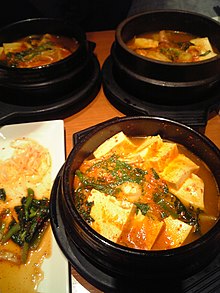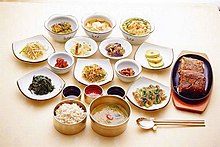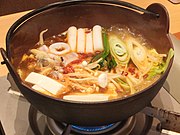Jjigae
 Dubu jjigae (Korean tofu stew) | |
| Type | Stew |
|---|---|
| Place of origin | Korea |
| Region or state | East Asia |
| Serving temperature | Hot |
| Main ingredients | Meat, seafood or vegetables; broth |
| Jjigae | |
| Hangul | |
|---|---|
| Revised Romanization | jjigae |
| McCune–Reischauer | tchigae |
 |
| This article is part of a series on |
| Korean cuisine 한국 요리 조선 료리 |
|---|
Jjigae (Korean: 찌개, Korean pronunciation: [tɕ͈iɡɛ]) is a Korean stew. There are many varieties; it is typically made with meat, seafood or vegetables in a broth seasoned with gochujang, doenjang, ganjang or saeujeot.[1] Jjigae is usually served in a communal dish, boiling hot.
A Korean meal almost always includes either a jjigae or a guk. During the Joseon dynasty, it was known as jochi, and two varieties would always be present on the King's surasang.[2]
The types of jjigae are often named according to their principal ingredients, such as saengseon jjigae (생선찌개) made from fish or dubu jjigae (두부찌개) made from tofu, or according to their broth and seasonings like gochujang jjigae (고추장찌개) or doenjang jjigae (된장찌개).
Varieties[]
By ingredient[]
- Altang (Korean: 알탕), made with pollock roe
- Dubu jjigae (Korean: 두부 찌개), made with firm tofu[3]
- Ge jjigae (Korean: 게 찌개), made with crab
- Kimchi jjigae (Korean: 김치 찌개), made with kimchi and other ingredients[3]
- Kongbiji jjigae (Korean: 콩비지 찌개), made with soybeans
- Budae jjigae (Korean: 부대 찌개), made with a spicy broth and assorted meats and other ingredients[4]
- Saengseon jjigae (Korean: 생선 찌개), made with fish. Dongtae jjigae (동태 찌개) is made from frozen pollack.
- Sundubu jjigae (Korean: 순두부 찌개), made with uncurdled soft tofu[5]

Sundubu jjigae (Korean: 순두부 찌개), a Korean stew made with uncurd tofu
By condiment[]
- Doenjang jjigae (Korean: 된장찌개), made with a doenjang broth[3]
- Cheonggukjang jjigae (Korean: 청국장찌개), made with cheonggukjang and other ingredients[3]
- Saeujeot jjigae (Korean: 새우젓찌개), made with saeujeot
- Gochujang jjigae (Korean: 고추장찌개), made with "gochujang" broth, usually including pork
- Myeongranjeot jjigae (Korean: 명란젓 찌개), made with myeongran jeot (salted fermented roe)

Hot dongtae jjigae, Korean pollack stew

See also[]
References[]
| Wikimedia Commons has media related to Jjigae. |
- ^ (in Korean) Jjigae at Doosan Encyclopedia
- ^ (in Korean) Jjigae Archived 2011-06-10 at the Wayback Machine at Nate Encyclopedia
- ^ a b c d "Korean Food: Stews". Life in Korea. Retrieved 2013-04-03.
- ^ "From Trash to Delicious Treasure". Hankooki/Korea Times. 2004-12-30. Archived from the original on 2006-01-13. Retrieved 2013-03-16.
- ^ "Donghae,Sokcho". Korea Tourism Organization. Archived from the original on 2013-11-05. Retrieved 2013-04-03.
- Korean soups and stews


